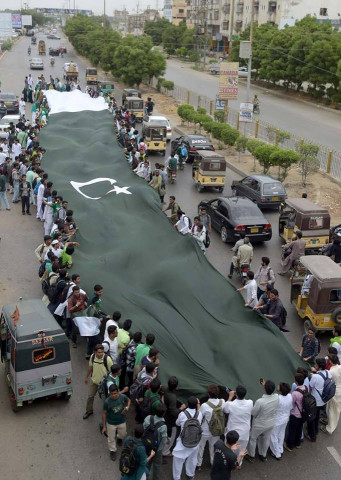Extraordinary reasons to celebrate Independence Day
Now, we need to actively construct a narrative which electrifies the country. Watch out world, Pakistan still has game

PHOTO: MUHAMMAD AZEEM/EXPRESS
Birth pangs of a Naya Karachi
Something remarkable is happening in Karachi. This Eid, whether I spoke to a rickshaw driver or a corporate executive, both told me the same thing: ‘Karachi kay halaat bauhat behtar ho gaye hain.’ Murder, kidnapping and car-jacking are palpably down according to most observers. Those of us waiting for a single Tahrir Square-style catharsis moment, which marks the overthrow of the old order in Karachi, are unlikely to find one. But record levels of Eid shopping, spending and a certain level of carefree joy are visible markers of change in the air. This is a once-in-a lifetime moment for us to rise above our fear and indifference by celebrating the visible improvement in the security situation across the city and the country. If we raise our collective voices today, we can make some of these security gains irreversible. While violence will, unfortunately, remain a part of everyday life, for example, with the persistence of street crime in Karachi, it’s still important to pause and appreciate the dramatic improvement in the overall security situation. Who would have thought peace would slowly return to Pakistan and that Karachi would lead the way?
The good news tsunami
China is investing over $40 billion in Pakistan. Iran’s breakthrough in talks with the international community could lead to a sanction-free trading partner and cheaper energy (especially gas) supplies for Pakistan. Moreover, persistently low oil prices may unleash a significant boom in Pakistan’s traditionally strong informal economy. Pakistan’s playing a positive role in the Afghan reconciliation process, and terror attacks in Pakistan, while always an ever-present danger, are showing a sharp downward trend.
Meanwhile, democracy in the country has also been strengthened as the Pakistani people and institutions have proved, after the judicial commission report on electoral rigging, that they are smarter than the usual toolbox of tricks played on them to pull a bait and switch. But abhi tau party shuru hui hai. Where the Tsunami has failed to create a Naya Pakistani state, it has succeeded in creating a Naya Pakistani society, by awakening the political consciousness of a previously indifferent generation. This generation is now coming back to bite the hands that fed it by demanding a higher standard of accountability from the Tsunami’s leaders. This is good for Pakistan. The expectations on the Tsunami are morphing from bringing about a revolution (which can be easily reversed as it was in Egypt) to bringing about real, incremental improvements; the Tsunami can play to its strengths here and actually beat expectations in a good way. After all, governance, much like cricket, isn’t just about the flashy shots knocking the ball out of the park. It’s also about taking the singles and doubles to build a solid innings i.e., the work of improving everyday governance. If the Tsunami learns the right lessons, its darkest hour today will be judged as its finest hour by history.
Extraordinary Pakistanis
Pakistan’s core strength has always been Pakistanis who have done remarkable things despite the extraordinary pressure on them. To hold these folks up as role models, I and a friend tried to document as many extraordinary Pakistanis as we could over the last 12 months. We ran into Zafar Ali, a young man from Fata, the son of a truck driver, who moved to Karachi to study at a school run by The Citizens Foundation (another extraordinary Pakistani story) and is today studying at a UWC campus, despite initially being labelled a terrorist, wrongly, by the authorities. “If all the bad guys can come together to hurt Pakistan, why can’t the good guys come together to help Pakistan?” argued Saad Latif, the first person we interviewed for this series. It’s time we connect the dots for the good guys.
The purpose of this article isn’t to gloss over the real problems that make life in Pakistan miserable. Instead, the idea is to show that there’s another side to Pakistan’s story that we’re all writing together. Pakistan’s psyche is a lot like our cricket team’s batting order. When one wicket falls, all of us collapse like a pack of cards. But when one top order batsman clicks, the team delivers an out-of-body experience, which electrifies the country. This article — and the Extraordinary Pakistanis series — highlights that some of our batsmen are beginning to click again. Now, we need to actively construct a narrative which electrifies the country. Watch out world, Pakistan still has game.
Happy Independence Day to all of us. Pakistan Zindabad!
Published in The Express Tribune, August 14th, 2015.
Like Opinion & Editorial on Facebook, follow @ETOpEd on Twitter to receive all updates on all our daily pieces.














COMMENTS
Comments are moderated and generally will be posted if they are on-topic and not abusive.
For more information, please see our Comments FAQ